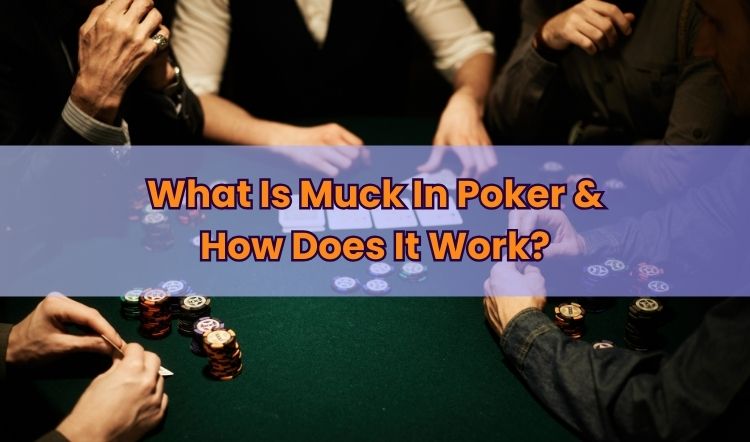
If you're new to poker, you've probably come across a number of new terms that may sound confusing at first. One such term is "muck". In simple terms, mucking your hand means discarding your cards without revealing them to other players.
Mucking happens in two main situations: when you fold your cards during a game or when the hand comes to a showdown and a player chooses not to show their losing cards.
Understanding when and why to muck can be important. It helps keep your playing strategy a secret from other players, which can be useful in future hands.
In this blog post from Egypt Slots, we'll explain all about mucking in poker, including when and how you should do it. This way, you'll have a better grasp of this part of the game.
What Does Muck Mean In Poker?
In poker, the term "muck" refers to the pile of discarded cards, usually located in the centre of the table. When a player "mucks" their hand, they are throwing their cards into this pile.
Typically, you muck your hand when you decide to fold. By folding, you're choosing not to continue in that round of betting, and you place your cards face-down into the muck. This means your cards are out of play and cannot be used again in that particular game.
Mucking can also occur at the end of a hand during a showdown. If a player doesn't have the winning hand, they can choose to muck their cards instead of showing them to everyone.
Mucking ensures that no one else sees your cards, keeping your playing strategy a secret. This can be a useful tactic if you don't want your opponents to learn your style of play. However, remember that once cards are mucked, they cannot be retrieved. So, always be sure about your decision before you muck your hand.
How Does Muck Work In Poker?
Mucking in poker is a straightforward process, but it's important to know how it works to avoid any mistakes. Here's a simple guide to help you understand:
During the Game
If you decide to fold your hand during a betting round, you muck your cards. To do this, you slide your cards face-down into the centre pile known as the muck. This action signals that you are no longer participating in the current hand.
At Showdown
At the showdown, all players still in the game reveal their cards to determine the winner. If you don't have a winning hand, you can choose to muck your cards instead of showing them. Simply push your cards, face-down, towards the muck pile. This keeps your losing hand hidden from the other players.
Mistakes to Avoid
Always make sure your intention to muck is clear. If you accidentally expose your cards to other players, they may be able to use this information about your decision-making in future hands. Once your cards are mucked, they're out of play and cannot be retrieved.
By following these steps, you can effectively use mucking to protect your strategy and keep the game fair for everyone.
What Is The Difference Between Show & Muck In Poker?
In poker, knowing the difference between "show" and "muck" is quite handy. These terms come into play at the showdown, when players reveal their hands to determine the winner.
Show
To "show" your hand means to turn your cards face up for everyone to see. This happens during the showdown when it's time to find out who has the best hand. By showing your cards, you're participating in the final comparison to decide the winner of the pot.
Muck
To "muck" your hand, you slide your cards face-down into the muck pile, keeping them hidden from other players. You might do this at the showdown if you realise your hand isn't strong enough to win and don't want other players to know what hand you had.
Key Difference
The key difference between show and muck lies in visibility. Showing your hand means revealing your cards to participate in the showdown. Mucking keeps your cards hidden and is essentially folding at the final point.
Knowing when to show and when to muck is a valuable skill, helping you keep control over what information you reveal during the game.
Should You Ever Show Cards In Poker?
Whether or not to show your cards in poker is a strategic decision. Revealing your hand can give other players a degree of insight into your playing style and thought process.
When to Show
Sometimes, showing your cards can be advantageous. For instance, if you've just made a bold bluff and want to unsettle your opponents, showing your winning hand can create an impression of confidence and unpredictability, which could help in later hands.
When Not to Show
Most of the time, it's better to keep your cards hidden. By not showing, you maintain an element of mystery and prevent others from understanding your strategy. This can make it harder for them to predict your future moves.
Friendly Games
In casual or friendly games, players sometimes show their hands for fun and to keep the atmosphere light. However, in competitive settings, it's usually best to keep your cards private unless required at the showdown.
Showing your cards is a personal choice and depends on the game situation and your strategy. Understanding when to reveal your hand and when to keep it hidden can be a useful skill to learn in the game.
However you choose to play, please do so responsibly. Remember, this blog post is for educational purposes and does not constitute betting advice.
